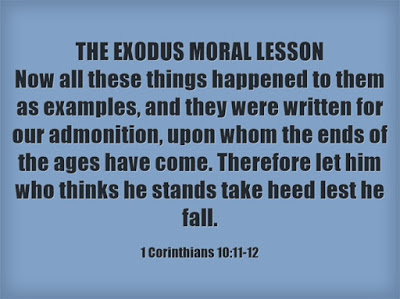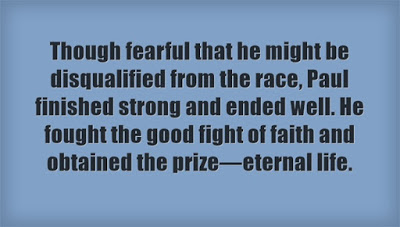
Fighting the good fight of faith

The apostle Paul likened the Christian life to a race of endurance. In order to win, athletes (believers) must exercise self-control and discipline.
Just as contenders in the Olympics need to be watchful about diet, rest, training and abide by the rules (no illegal drugs such as anabolic steroids), believers too have to learn how to control our fleshly desires and passions. We have to subdue our carnal inclinations so that we can finish the race well.
“Do you not know that in a race all the runners run, but only one receives the prize? So run that you may obtain it. Every athlete exercises self-control in all things. They do it to receive a perishable wreath, but we an imperishable. So I do not run aimlessly; I do not box as one beating the air. But I discipline my body and keep it under control, lest after preaching to others I myself should be disqualified” (1 Corinthians 9: 24-27).

Let’s delve into the meaning of this verse, 1 Corinthians 9:27: “But I discipline my body and keep it under control, lest after preaching to others I myself should be disqualified.” What does it really mean and what is its relevance to us?
Paul compared himself to a contender (runner) and a herald (preacher) of the race. Though he was perhaps the most faithful apostle in Christendom, past or present, he was afraid that he might not finish well.
The Greek word from which ‘disqualified’ is derived is ‘adokimos’, which can also mean the following: failing to pass the test, unapproved, castaway, rejected, reprobate. It is a very serious term that cannot be trifled with. Apparently, ‘adokimos’ refers to bad metals which fail to pass the test; thus they are rejected or cast away.
Put simply, Paul was afraid that he might be disapproved, rejected, cast away, deemed unfit to enter heaven. If he had allowed himself to be overcome by his inherently corrupt nature, he would not finish well and might even lose his salvation.
Two questions logically follow when we consider this verse, 1 Corinthians 9:27.
Firstly, is Paul’s fear positive or negative? It is definitely positive for it keeps him from making the greatest mistake in life—to be lost and damned for all eternity.
Secondly, if super apostle Paul feared that he might not make the grade in eternity, how much more ordinary heaven-bound citizens should live their days on earth with godly fear!
Come to think of it, if Paul entertained the thought he could possibly be disqualified from heaven, how much more “spiritual plebeians” like us should be cautious that we might not reach our intended final destination if we fail to fulfil certain conditions (Matthew 7:13,14, Luke 13:24).
Not everyone will agree with this interpretation of 1 Corinthians 9:27, but let me explain why this verse is not just a red herring. Using a single verse to build a doctrine or premise is not a sound principle. So other references that reinforce this particular verse are listed below.
Any believer who continues to willfully live in sin will miss out on heaven if he fails to repent. God is impartial. He is no respecter of persons.
“Or do you not know that the unrighteous will not inherit the kingdom of God? Do not be deceived: neither the sexually immoral, nor idolaters, nor adulterers, nor men who practice homosexuality, nor thieves, nor the greedy, nor drunkards, nor revilers, nor swindlers will inherit the kingdom of God”(1 Corinthians 6:9-10)
Past faithfulness cannot nullify present sinfulness.
“When a righteous person turns away from his righteousness and does injustice, he shall die for it; for the injustice that he has done he shall die. For I have no pleasure in the death of anyone, declares the Lord God; so turn, and live”(Ezekiel 18: 26, 32).
If a believer fails to endure, he or she may lose the chance of entering heaven.
“Take care, brethren, that there not be in any one of you an evil, unbelieving heart that falls away from the living God. But encourage one another day after day, as long as it is still called Today, so that none of you will be hardened by the deceitfulness of sin. For we have become partakers of Christ if we hold fast the beginning of our assurance firm until the end” (Hebrews 3: 12-14).
“For you have need of endurance, so that when you have done the will of God you may receive what is promised. But we are not of those who shrink back and are destroyed, but of those who have faith and preserve their souls”(Hebrews 10:36,39).

The moral failure of God’s people serves as a warning to us.
After leaving Egypt and miraculously crossing the Red Sea, they failed to enter the Promised Land because they committed sexual immorality and worshiped idols, not holding fast to their faith till the end (1 Corinthians 10:7-9).
The apostle Paul teaches that the failure of the exodus generation is meant to be a lesson to us. We need to keep ourselves in the love of God if we want to inherit eternal life. “Now these things happened to them as an example, but they were written down for our instruction, on whom the end of the ages has come” (1 Corinthians 10: 11).
Even Paul, for all the ministry success to his credit, was afraid that he might eventually be disqualified and cast away. So nothing is predetermined or “automatic” in the Christian life. Whether one is a great minister or an ordinary believer, one has to be faithful and endure to the end in order to inherit eternal life.
That’s why Paul was jubilant when he finished strong and ended the race well: “I have fought the good fight, I have finished the race, I have kept the faith. Finally, there is laid up for me the crown of righteousness, which the Lord, the righteous Judge, will give to me on that Day, and not to me only but also to all who have loved His appearing” (2 Timothy 4: 7-8).
However, we do not strive by our own strength to keep ourselves in God’s love. By seeking God and through the Holy Spirit’s empowerment, we are able to walk the straight, narrow and difficult way amid trials and temptations.
As the passage in Philippians 2:12-13 puts it, “Work out your own salvation with fear and trembling, for it is God who works in you, both to will and to work for his good pleasure.”

Though fearful that he might be disqualified from the race, Paul finished strong and ended well. He fought the good fight of faith and obtained the prize of unsurpassed worth—eternal life.
KEY TEXTS
Run the race with discipline and godly fear in order to finish well
“Do you not know that in a race all the runners run, but only one receives the prize? So run that you may obtain it. Every athlete exercises self-control in all things. They do it to receive a perishable wreath, but we an imperishable. So I do not run aimlessly; I do not box as one beating the air. But I discipline my body and keep it under control, lest after preaching to others I myself should be disqualified” (1 Corinthians 9: 24-27).
“Work out your own salvation with fear and trembling, for it is God who works in you, both to will and to work for his good pleasure” (Philippians 2:12-13).
“I have fought the good fight, I have finished the race, I have kept the faith. Finally, there is laid up for me the crown of righteousness, which the Lord, the righteous Judge, will give to me on that Day, and not to me only but also to all who have loved His appearing” (2 Timothy 4: 7-8).
FAITH: ACTIVE, NOT PASSIVE
“It would not be difficult to point out at least twenty-five or thirty distinct passages in the Epistles where believers are plainly taught to use active personal exertion, and are addressed as responsible for doing energetically what Christ would have them do, and are not told to “yield themselves” up as passive agents and sit still, but to arise and work. A holy violence, a conflict, a warfare, a fight, a soldier’s life, a wrestling, are spoken of as characteristic of the true Christian.”
― Dr Michael L. Brown
RELATED POSTS
A Facebook friend commented that we should not incite fear in people by saying that believers can lose their salvation: “If you make believers feel insecure about their salvation in Jesus, you are causing unnecessary fear. Why are you putting fear in people? This is not from God.” But don’t you think fear can be positive?
A powerful prophet of God once enjoyed God’s favour but failed to make it to heaven. Being counted among God’s chosen ones is no guarantee that all will end well. Who is he?
God’s love towards believers is immeasurable but can we take it for granted?
Some believers may lose their eternal rewards BUT eventually they are saved. In the Parable of the Ten Virgins, did the foolish virgins merely lose their rewards or much more?
Two different views—easy and difficult ways to heaven
As believers, what’s the point of having great miraculous power, riches, wisdom and unbridled pleasure at our disposal if we miss out on heaven?
Note: Dr Lim Poh Ann is a medical practitioner. He was the former editor of Asian Beacon magazine (Dec 2008 – Oct 2011). He can be reached at his Facebook page, www.facebook.com/AskDrLi
SOURCE OF ARTICLE: http://limpohann.blogspot.my/2017/06/finishing-strong-ending-well.html
|Share The Good News|
Lim Poh Ann




Leave a Reply